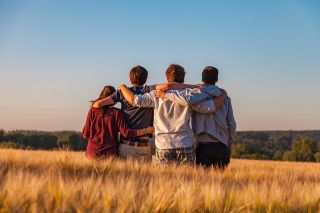As Hurricane Ida devastated my community a few years ago, I was scrambling to figure out what to do. Should I bring five pairs of underwear, or will I have a place to do laundry? Is it silly to pack my skincare at a time like this? The paintings on the wall, the antique books from grandfather’s immigration from Scotland—what is most important to take, and what can we risk leaving?

Like many, I have been helplessly glued to the television, hoping and praying for the safety of all living beings in Los Angeles. Nothing truly prepares you for the gut-wrenching feeling of leaving everything behind, of having a short amount of time to figure out what to take with you and what to leave.
People start doing anything they can to protect their homes. You never know whether your home will still be standing when you return, or if you’ll have a home to return to at all. It becomes a mix of terror, uncertainty, and, honestly, disbelief. There are so many things to consider: trying to convince family and loved ones to leave, making sure you find a place that can take pets, figuring out transportation. Do we evacuate? Hunker down? Go to higher ground? Decisions are made, then changed. Options are weighed, then people second guess, reconsider. You feel guilty and scared.
Recovery isn’t just about repairing physical damage
When you’re in the middle of a disaster, your first instinct is often survival. The focus is on getting out of danger and securing basic needs like food, water, and shelter. But once the immediate threat to your life passes, the emotional effects will sweep in. It’s in these moments that we begin to feel the weight of what we’ve been through, even if it’s days, weeks, or months after the event.
Entire communities are devasted during natural disasters, leaving survivors feeling scared, helpless, and alone. It can feel like being on an emotional roller coaster. In the moment, you’re caught in a whirlwind of fear, confusion, and a desperate desire for safety. Next, you feel overwhelming guilt, anxiety, and fear. Was leaving the right thing? What did we leave behind? Will anything be there when we get back? What about those who didn’t make it out?
Many will not understand
I remember driving to the local grocery store in the city where we had evacuated. As I perused the shelves, looking for something my picky cat would eat, I overheard the store clerks talking about the storm. They were saying things like “Hopefully it doesn’t come here!” and “Why do people live in that area with such a bad hurricane risk?” Hearing this felt so insensitive and isolating.
I fought back tears as I handed my debit card over to the cashier, who asked me for my identification. Noticing my address, I saw realization cross her face that I was an evacuee. “Well,” she stammered, “at least you survived.” I didn’t answer. I couldn’t answer. What was there to say? it’s just not that simple. It doesn’t just end here.
Even if the worst hasn’t happened, the psychological burden of constant uncertainty weighs heavily. It’s not as easy as just getting out. The belongings you take with you don’t make up for the life you might lose: the schools your kids won’t return to, the coffee shops that greeted you on your morning commutes. For many survivors, the relief over surviving is quickly replaced by the fear of never being able to return to normal, or, even worse, the possibility that normal might no longer exist.
Finding support in community
As fires continue to rage across Los Angeles, many residents are experiencing intense stress and fear. There is nothing that can prepare you for this, and nothing that anyone can say to make it better. It may seem impossible that anyone will ever “move on” after such a traumatic experience. For those living through this, acknowledging that you’ve been through something difficult and that it’s OK to feel unsettled, anxious, or even numb, is an important thing for you right now.
Find support in others who understand. Whether it’s reaching out to friends and family, joining online support groups, or seeking support from others who survived something similar, finding support in community can be a major lifeline during this time. It will sometimes be easier to talk to those who have survived what you did, but it can also be equally comforting to exist in silence with them. Understanding and support often come not just through words but in the quiet space between them—where what’s unspoken is still deeply understood.
After Ida, we leaned heavily on our community. Some came together to build shelters for those who had lost their homes, others made meals for neighbors and friends who were still without power, and we checked on each other’s loved ones. But, it wasn’t the hot meals or being able to use a friend’s place to shelter; it was knowing that there were others who understood.
